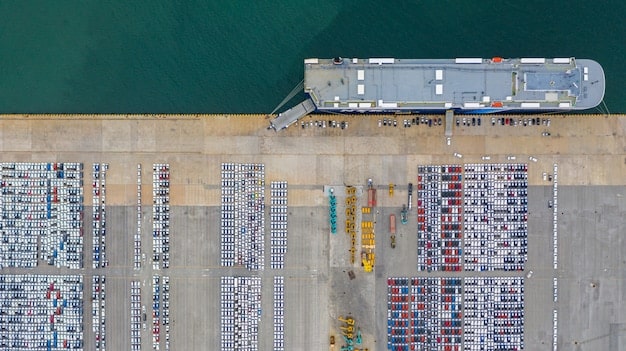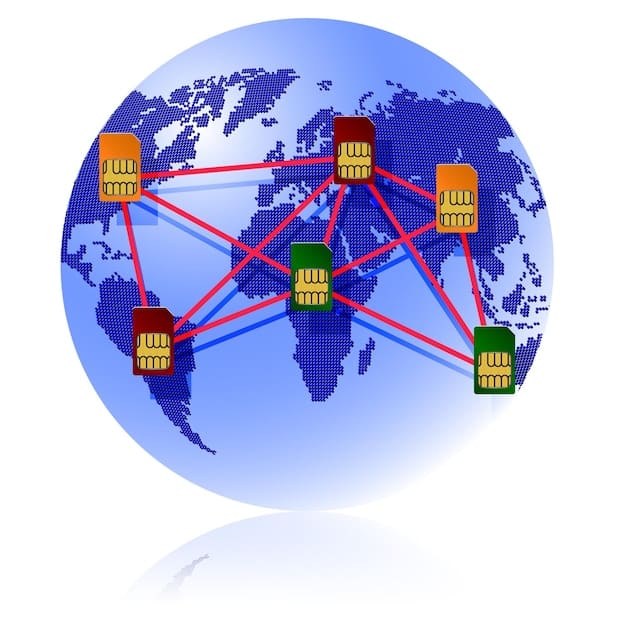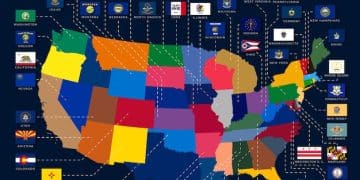US Sanctions Update: Countries Facing New Restrictions and Supply Chain Impact

US sanctions are a foreign policy tool that restricts trade and financial interactions with specific countries and entities, impacting global supply chains by creating barriers and uncertainties in international commerce.
The recent US Sanctions Update: Which Countries Face New Restrictions and How Will This Affect Supply Chains? is a crucial topic for businesses, policymakers, and anyone involved in international trade. Let’s explore the current landscape of US sanctions and its wide-ranging impacts.
Understanding US Sanctions: An Overview
US sanctions are a powerful foreign policy tool used to address a variety of national security and foreign policy concerns. These measures restrict or prohibit certain activities with specific countries, entities, or individuals. Understanding the basics of US sanctions is crucial before we delve deeper.
Sanctions can take many forms, from comprehensive embargoes that prohibit nearly all transactions with a country to targeted sanctions that focus on specific individuals or entities. They can restrict trade, freeze assets, limit access to the US financial system, and impose travel bans.
Types of Sanctions
The US government employs various types of sanctions to achieve its foreign policy goals. Some common types include:
- Comprehensive Sanctions: These are broad-based measures that prohibit nearly all transactions with a target country.
- Targeted Sanctions: These sanctions focus on specific individuals, entities, or sectors within a country.
- Secondary Sanctions: These measures target foreign individuals or entities that do business with sanctioned parties.
- Sectoral Sanctions: These restrict specific economic sectors, such as energy or finance.
Key Sanctioning Authorities
Several US government agencies are involved in the implementation and enforcement of sanctions. The primary agencies include:
- Office of Foreign Assets Control (OFAC): OFAC, part of the Treasury Department, administers and enforces most US sanctions programs.
- State Department: The State Department plays a key role in developing and implementing sanctions policies.
- Commerce Department: The Commerce Department regulates exports and certain transactions that could violate sanctions.
US sanctions are a complex and constantly evolving area of law and policy. Staying informed about the latest developments is essential for businesses and individuals engaged in international activities.
Countries Facing New or Increased Restrictions
The US sanctions landscape is dynamic, with countries frequently being added to or removed from sanctions lists, or facing increased or decreased restrictions. It’s crucial to stay updated with these changes.
Several countries have faced new or increased US sanctions in recent times due to various geopolitical and policy reasons. These restrictions can have a significant impact on their economies and trade relationships.

Recent Additions to Sanctions Lists
Here are some of the countries that have recently been added to US sanctions lists or have had existing sanctions significantly expanded:
- Russia: Due to the ongoing conflict, Russia has faced expanded and intensified sanctions targeting its financial, energy, and defense sectors.
- Iran: US sanctions against Iran remain comprehensive, impacting its oil exports, banking system, and access to international markets.
- North Korea: North Korea continues to face extensive sanctions due to its nuclear weapons program.
- Venezuela: Sanctions on Venezuela target its oil industry and government officials, aiming to promote democratic change.
Reasons for Increased Restrictions
The reasons for increased restrictions vary depending on the country and the specific US policy concerns. Common reasons include:
- National Security Concerns: Sanctions are often imposed to address threats to US national security.
- Human Rights Abuses: Sanctions may target countries with poor human rights records.
- Nuclear Proliferation: Sanctions are used to prevent the spread of nuclear weapons.
- Support for Terrorism: Sanctions target countries that support terrorist groups.
The US government regularly reviews and updates its sanctions policies based on evolving global events and policy priorities. Staying informed about these changes is crucial for understanding their potential impact on supply chains.
Impact on Global Supply Chains: Key Considerations
US sanctions can have a profound impact on global supply chains. Businesses need to understand these potential disruptions and take steps to mitigate their risks.
When the US imposes sanctions on a country or entity, it can create barriers to trade, investment, and financial transactions. These barriers can ripple through supply chains, causing delays, increased costs, and even complete disruptions.

Disruptions and Delays
Sanctions can lead to significant disruptions and delays in supply chains. Some common consequences include:
- Restrictions on Imports and Exports: Sanctions may prohibit or restrict the import or export of certain goods and services.
- Payment Difficulties: Sanctions can make it difficult to process payments to or from sanctioned countries or entities.
- Increased Scrutiny: Transactions involving sanctioned countries or entities may face increased scrutiny from regulators and financial institutions.
- Logistics Challenges: Shipping, insurance, and other logistics services may be more difficult to obtain for sanctioned destinations.
Increased Costs
In addition to disruptions and delays, sanctions can also lead to increased costs for businesses operating in global supply chains. These costs can include:
- Compliance Costs: Businesses may need to invest in compliance programs to ensure they are not violating sanctions regulations.
- Legal Fees: Sanctions-related legal advice can be expensive.
- Alternative Sourcing: Finding alternative sources of supply can be costly and time-consuming.
- Increased Transportation Costs: Shipping goods to or from sanctioned destinations may involve higher transportation costs.
Businesses need to carefully assess the potential impact of US sanctions on their supply chains and take steps to manage these risks effectively. This includes conducting thorough due diligence, implementing robust compliance programs, and diversifying their supply base.
Compliance Strategies for Businesses
Navigating the complex landscape of US sanctions requires a robust compliance strategy. Businesses must take proactive steps to ensure they are not violating sanctions regulations.
Compliance with US sanctions is not just a legal requirement; it’s also a matter of ethical and reputational responsibility. Businesses that fail to comply with sanctions can face severe penalties, including fines, asset forfeiture, and criminal charges.
Due Diligence
Conducting thorough due diligence is a critical first step in ensuring sanctions compliance. This involves:
- Screening Parties: Screening customers, suppliers, and other business partners against sanctions lists.
- Transaction Monitoring: Monitoring transactions for potential sanctions violations.
- Know Your Customer (KYC): Implementing KYC procedures to verify the identity and legitimacy of customers.
Compliance Programs
Developing and implementing a comprehensive sanctions compliance program is essential for businesses operating in global markets. A robust compliance program should include:
- Written Policies and Procedures: Documenting clear policies and procedures for sanctions compliance.
- Employee Training: Providing regular training to employees on sanctions regulations and compliance requirements.
- Internal Controls: Implementing internal controls to prevent and detect sanctions violations.
- Auditing and Monitoring: Conducting regular audits and monitoring to ensure compliance programs are effective.
Compliance with US sanctions is an ongoing process. Businesses must stay informed about changes in regulations and update their compliance programs accordingly. Engaging with legal counsel and compliance professionals can help businesses navigate this complex area effectively.
Geopolitical Factors Influencing Sanctions Decisions
US sanctions decisions are often influenced by a complex interplay of geopolitical factors. Understanding these factors is crucial for anticipating potential changes in sanctions policies.
Sanctions are not implemented in a vacuum. They are often used as a tool to advance US foreign policy objectives in response to specific geopolitical events or trends.
International Relations
The state of US relations with other countries can significantly influence sanctions decisions. For example:
- Alliances: The US may be less likely to impose sanctions on close allies.
- Adversaries: Sanctions are more likely to be used against countries considered adversaries.
- International Cooperation: The US may coordinate sanctions with other countries to increase their effectiveness.
Global Events
Major global events, such as conflicts, political instability, or humanitarian crises, can also trigger or influence sanctions decisions. For instance:
- Conflicts: Sanctions may be imposed on countries involved in armed conflicts.
- Political Instability: Sanctions may be used to promote democratic transitions in countries experiencing political unrest.
- Humanitarian Crises: Sanctions may be imposed to address human rights abuses or humanitarian emergencies.
Geopolitical factors are constantly evolving, and staying informed about these changes is essential for understanding the potential direction of US sanctions policies. Businesses can benefit from monitoring geopolitical developments and consulting with experts to assess their potential impact on their operations.
Future Trends in US Sanctions Policy
Looking ahead, several trends are likely to shape the future of US sanctions policy. Businesses need to be aware of these trends and prepare for potential changes in the sanctions landscape.
US sanctions policy is not static; it evolves in response to changing global conditions and policy priorities. Understanding the likely future trends can help businesses anticipate and manage risks effectively.
Increased Use of Targeted Sanctions
There is a growing trend toward the use of targeted sanctions that focus on specific individuals, entities, or sectors, rather than broad-based measures that affect entire economies. This approach aims to minimize collateral damage and maximize the impact on those responsible for the targeted behavior.
Greater Emphasis on Cyber-Related Sanctions
With the increasing importance of cyberspace, sanctions related to cyber activities are likely to become more common. These sanctions may target individuals or entities involved in cyberattacks, intellectual property theft, or other malicious cyber activities.
Coordination with Allies
The US is likely to continue coordinating sanctions with its allies to increase their effectiveness and legitimacy. This may involve working with the European Union, the United Kingdom, and other countries to impose coordinated sanctions against common targets.
Technological Advancements and Sanctions Evasion
As technology advances, so do the methods used to evade sanctions. The US government will likely focus on developing new tools and strategies to combat sanctions evasion, including the use of artificial intelligence and data analytics to detect suspicious transactions and activities.
The future of US sanctions policy is likely to be shaped by a complex interplay of geopolitical factors, technological advancements, and evolving policy priorities. Staying informed about these trends is crucial for businesses operating in global markets.
| Key Point | Brief Description |
|---|---|
| 🌍 Global Impact | Sanctions restrict trade with specific countries, creating supply chain barriers. |
| 🎯 Targeted Measures | Focus on specific entities and sectors to minimize widespread economic effects. |
| ⚠️ Compliance Risks | Businesses must navigate complex rules to avoid penalties and maintain ethical standards. |
| 🔄 Policy Shifts | Expect changes in strategy to adress cyber threats and evasion of sanctions. |
Frequently Asked Questions About US Sanctions
▼
US sanctions are restrictions imposed on specific countries, entities, or individuals to further foreign policy and national security objectives. They can include trade embargoes, asset freezes, and travel bans, limiting economic and financial interactions.
▼
Several countries face US sanctions, including Russia, Iran, North Korea, and Venezuela. These sanctions vary in scope and severity, targeting different sectors and activities within each country based on specific US concerns.
▼
US sanctions can disrupt global supply chains by restricting trade and financial transactions with sanctioned entities. This leads to delays, increased costs, and the need for businesses to find alternative sourcing and compliance strategies.
▼
Businesses should conduct thorough due diligence, screen parties against sanctions lists, monitor transactions, and develop comprehensive sanctions compliance programs that include written policies, employee training, and internal controls to prevent violations.
▼
Future trends in US sanctions policy include increased use of targeted sanctions, greater emphasis on cyber-related sanctions, coordination with allies to enhance effectiveness, and efforts to combat sanctions evasion through technological advancements.
Conclusion
Staying informed about US sanctions is essential for navigating the complexities of global trade and ensuring compliance. By understanding the current landscape, potential impacts, and future trends, businesses can effectively manage risks and maintain ethical standards in an ever-changing world.





